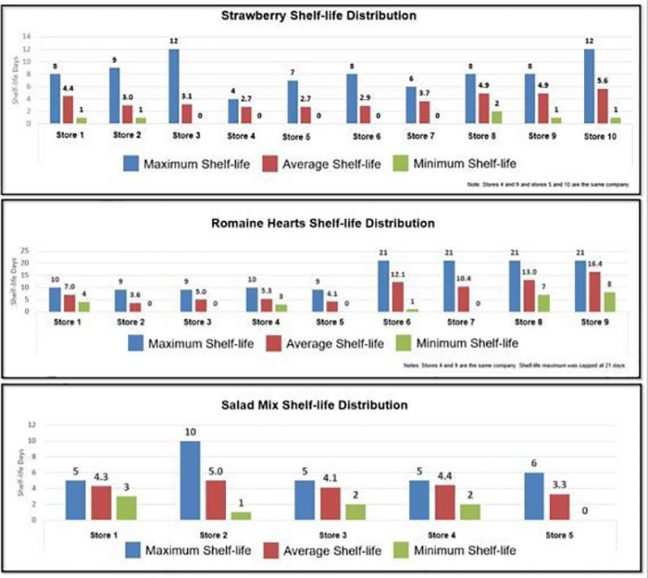Zest Labs has released the results of a research study measuring and comparing the shelf life (or freshness) of produce being sold at major grocery chain stores across the United States. The research found that the freshness of produce varied significantly from store to store as well as within each individual store. This variability causes early spoilage, which can disappoint consumers and result in costly retail waste.
The study, performed from February to May of 2019, was based on random samples of strawberry clamshells, hearts of romaine lettuce and packaged salad mixes purchased throughout the research period from eight major U.S. grocery store chains.
“Zest Labs’ methodology for determining shelf-life is based on years of university research on the effect of environmental conditions on the quality of fresh fruits and vegetables,” said Dr. Cecilia Nunes, Ph.D., associate professor at the University of South Florida Department of Cell Biology, Microbiology and Molecular Biology. “Major universities including University of Florida and University of South Florida have confirmed that this approach is scientifically validated and accurate.”
Produce that looks good on the store shelf, but “goes bad” shortly after purchase creates a poor consumer experience, which can lead to changed purchasing behavior. This problem is due to harvest conditions and variabilities in processing and handling, which can cause produce to spoil before the written expiration date.
Key findings from the research:
• Roughly half of the sample produce (49 percent of romaine hearts, 58 percent of purchased strawberries and 54 percent of packaged salad mixes) spoiled prematurely, based on target shelf life.
• Shelf-life variation of produce within individual stores varied dramatically by as much as 21 days for romaine, 12 days for strawberries and nine days for packaged salad mixes. Several stores sold produce that had expired or spoiled at the time of purchase (as indicated by a zero minimum shelf life value).
 “Most grocery stores assume that the produce they are receiving has uniform freshness or shelf-life, but the data shows there is significant variation in freshness both between stores in a region and within the individual stores themselves,” said Peter Mehring, CEO of Zest Labs. “This shelf-life variability leads to dissatisfied customers who purchase produce that spoils before they can consume it and, as a result, may take their business elsewhere to find fresher, more consistent quality produce.”
“Most grocery stores assume that the produce they are receiving has uniform freshness or shelf-life, but the data shows there is significant variation in freshness both between stores in a region and within the individual stores themselves,” said Peter Mehring, CEO of Zest Labs. “This shelf-life variability leads to dissatisfied customers who purchase produce that spoils before they can consume it and, as a result, may take their business elsewhere to find fresher, more consistent quality produce.”
Zest Fresh, from Zest Labs, helps retailers identify and manage fresh food supply chain variability. Zest Fresh provides growers, shippers and retailers with autonomous, end-to-end cold chain visibility. By managing the handling and quality of each pallet of produce beginning in the field, Zest Fresh enables matching of the retailers’ freshness needs with the actual produce freshness while monitoring adherence to the grower’s processes.
Zest Labs, a subsidiary of Ecoark Holdings, Inc., provides solutions that improve quality consistency and drive sustainability for clients. Zest Labs increases efficiency through continuous condition monitoring and real-time prescriptive analytics.






